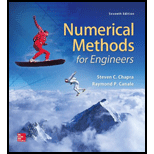
Use simple fixed-point iteration to locate the root of
f(x)=sin (√x)−x
Use an initial guess of x0=0.5 and iterate until εa≤0.01%. Verify that the process is linearly convergent as described in Box 6.1.
To calculate: The root of the function f(x)=sin(√x)−x by the use of simple fixed-point iteration with x0=0.5 as the initial condition and iterate until εa≤0.01%. Also, verify that the process is linearly convergent.
Answer to Problem 1P
Solution:
The root of the function f(x)=sin(√x)−x is 0.7686.
Explanation of Solution
Given:
The function, f(x)=sin(√x)−x.
The initial condition, x0=0.5 and iterate until εa≤0.01%.
Formula used:
The simple fixed-point iteration formula for the function x=g(x),
xi+1=g(xi)
And, formula for approximate error is,
εa=|xi+1−xixi+1|100%
Calculation:
Consider the function,
f(x)=sin(√x)−x
The function can be formulated as fixed-point iteration as,
0=sin(√x)−xx=sin(√x)xi+1=sin(√xi)
Use initial guess of x0=0.5, the first iteration is,
x0+1=sin(√x0)x1=sin(√0.5)=sin(0.7071)=0.6496
Therefore, the approximate error is,
εa=|0.6496−0.50.6496|×100%=|0.14960.6496|×100%=|0.2303|×100%=23.03%
Use x1=0.6496, the second iteration is,
x1+1=sin(√x1)x2=sin(√0.6496)=sin(0.80598)=0.7215
Therefore, the approximate error is,
εa=|0.7215−0.64960.7215|×100%=|0.07190.7215|×100%=|0.09965|×100%=9.965%
Use x2=0.7215, the second iteration is,
x2+1=sin(√x2)x3=sin(√0.7215)=sin(0.8494)=0.7509
Therefore, the approximate error is,
εa=|0.7509−0.72150.7509|×100%=|0.02940.7509|×100%=|0.03915|×100%=3.915%
Similarly, all the iteration can be summarized as below,
| i | xi | εa=|xi+1−xixi+1|100% |
| 0 | 0.5 | |
| 1 | 0.6496 | 23.03% |
| 2 | 0.7215 | 9.965% |
| 3 | 0.7509 | 3.915% |
| 4 | 0.7621 | 1.47% |
| 5 | 0.7662 | 0.535% |
| 6 | 0.7678 | 0.208% |
| 7 | 0.7683 | 0.0651% |
| 8 | 0.76852 | 0.029% |
| 9 | 0.7686 | 0.01% |
Since, the approximate error in the ninth iteration is 0.01%. So, stop the iteration.
Hence, the root of the function is 0.7686.
Now, to verify that the process is linearly convergent, the condition to be satisfied is |g′(x)|<1 for x=0.7686.
The fixed-point iteration is,
xi+1=sin(√xi)
Therefore,
g(x)=sin(√x)
Differentiate the above function with respect to x,
g′(x)=ddx[sin(√x)]=cos(√x)ddx(√x)=cos(√x)(−12√x)=−cos(√x)2√x
Therefore, |g′(x)| at x=0.7686 is,
|g′(0.7686)|=|−cos(√0.7686)2√0.7686|=|−0.63972×0.8767|=|−0.3648|=0.3648
Since, |g′(0.7686)|<1. Hence, it is verified that the process is linearly convergent.
Want to see more full solutions like this?
Chapter 6 Solutions
Numerical Methods for Engineers
- Using Karnaugh maps and Gray coding, reduce the following circuit represented as a table and write the final circuit in simplest form (first in terms of number of gates then in terms of fan-in of those gates).arrow_forwardConsider the alphabet {a, b, c}.• Design a regular expression that recognizes all strings over {a, b, c} that have at least three nonconsec-utive c characters (two characters are non-consecutive if there is at least one character between them)and at least one a character.• Explain how your regular expression recognizes the string cbbcccac by clearly identifying which partsof the string match to the components of your regular expressionarrow_forwardComplex Analysis 2 z3+3 Q1: Evaluate cz(z-i)² the Figure. First exam 2024-2025 dz, where C is the figure-eight contour shown inarrow_forward
- Construct a state-level description (i.e., a state diagram with transitions) for aTuring machine that decides the language {a^(n)b^(2n)c^(n) | n ∈ N}.arrow_forwardFind the sum of products expansion of the function F (x, y, z) = ̄x · y + x · z in two ways: (i) using a table; and (ii) using Boolean identitiesarrow_forwardThe NOR operator, denoted as ↓, behaves as 0 ↓ 0 = 1, 0 ↓ 1 = 0, 1 ↓ 0 = 0,1 ↓ 1 = 0. Show that the any Boolean function over any number of variables can be expressed using onlyNOR operators (in addition to those variables and constants). HINT: Recall that any Boolean function hasa representation as a sum of products expansionarrow_forward
- Consider the Turing machine given in lecture which decides the languageB = {w#w | w is a binary string}.Simulate the Turing machine to show that the string 1001#1001 will be accepted by the Turing machine. Show all steps.arrow_forwardQ/Find the Laurent series of (2-3) cos↓ around z = 1. 2-1arrow_forward#1). A technique is given with 150 mAs is 40 kV and produces an EI value = 400. Find the new EI value, if mAs is 75 and 34 kV are used.arrow_forward
- Q3: Answer the following: (i) Let f(z) is an analytic function in a simply connected domain S and y is a simple, closed, positively oriented contour lying in S. Prove that f, f(z)dz = 0.arrow_forwardUse the method of undetermined coefficients to solve the given nonhomogeneous system.X' = −1 33 −1 X + −4t2t + 2 X(t) =arrow_forwardDetailed report without CHATGPT, accept if you can give with code and plots, previous reported . Do not waste my question.arrow_forward
- Algebra & Trigonometry with Analytic GeometryAlgebraISBN:9781133382119Author:SwokowskiPublisher:Cengage


